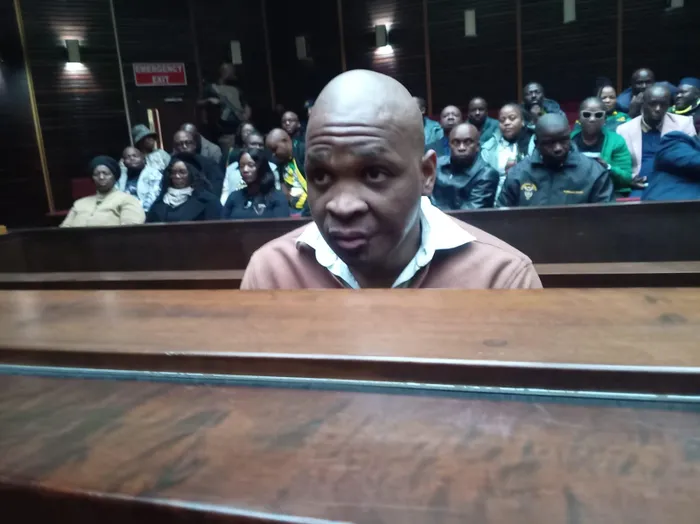Political violence in KwaZulu-Natal: Why Moerane Commission recommendations remain unimplemented

Sibusiso Ncengwa will be sentenced next Monday for participating in the killing of Sindiso Magaqa, the former ANCYL secretary-general.
Image: Bongani Hans
The recommendations of the Moerane Commission, which investigated the spate of political killings in KwaZulu-Natal, are gathering dust without being implemented seven years after they were released, while the killings continued unabated.
Former premier Willies Mchunu said one of the recommendations was the establishment of an independent panel, which was to forge peace within and among political parties.
Mchunu established the Advocate Marumo Moerane SC-led commission in October 2016 during the peak of political killings, which at the time exceeded 150, to identify their root cause and how they could be eliminated.
He said Moerane suggested that the panel should help politicians, who would normally kill each other for tenders and positions.
However, the establishment of the panel would require funding.
“Only the government, which keeps taxes, should be doing this,” he said.
Premier Thami Ntuli and the National Prosecuting Authority (NPA) in the province had not yet responded to requests for comment.
Mchunu, who was the premier between 2016 and 2019, said he could not establish this panel because his term of office was running out.
The issue of political killings after the commission’s recommendation was topical at the Pietermaritzburg High Court on Monday when the NPA and defence lawyers debated it during Sibusiso Ncengwa’s mitigation of sentence.
Ncengwa will be sentenced next Monday after he confessed to the killing of the former ANC Youth League secretary-general, Sindiso Magaqa, who was an ANC councillor at the Mzimkhulu Municipality when he was gunned down in 2017.
In his affidavit, Ncengwa confessed that he and his fellow hitmen were hired by the former mayor of the Mzimkhulu Municipality, Mluleki Ndobe, who was also ANC’s Harry Gwala Region chairperson, and other senior officials, including a municipal manager, to eliminate Magaqa.
Magaqa’s sin was that he was about to spill the beans on the corrupt-riddled tender to build a local memorial hall.
He was executed in broad daylight at a car wash on July 13, 2017. Other councillors who were with him survived with bullet wounds.
The assassins were paid a total of R620,000 and also promised a R1 million tender.
The State and the defence had agreed to a jail sentence of less than life on condition that Ncengwa would soon testify against the people his affidavit implicated.
Ndobe committed suicide on November 6, 2020, while the assassin, Jabulani Mdunge, who allegedly shot Magaqa with an AK-47 obtained from a crime intelligence officer, was later killed in a shootout with police.
Mchunu said the political killings in the province would not end as long as there are political parties’ elective conferences, and general, local government, and by-elections, because politicians were greedy for power and material benefits.
“For those things (power and benefits), they will continue to fight one another to the extent of even killing one another.
“That is why there should be an independent programme to teach those who are participants in politics about how to conduct themselves civilly.”
Mchunu said the provincial government should consult Moerane and the African Centre for the Constructive Resolution of Disputes (ACCORD) for advice on how to establish the peace-making body.
During the court proceeding on Monday, NPA’s Advocate Elvis Gcweku and Ncengwa’s advocate, Andrew Matlamela, spoke about the political killings continuing after the Moerane Commission.
People who testified at the commission about Magaqa’s murder were lined up as witnesses in the murder trial.
“When I perused the commission’s report, there was an opening quotation that says, ‘something is rotten in the state of Denmark’.
“That commission was clearly describing the state of KwaZulu-Natal in respect of the political killings,” said Ngcweku.
He said the commission concluded that Magaqa’s killing was linked to the corruption in Mzimkhulu Municipality, whose hall’s construction took a long time than expected to be completed, while money had already been spent.
Magaqa demanded progress in the construction and also proposed forensic investigations, and that the matter be debated at the council.
“What is common about the killing of politicians in KwaZulu-Natal is the issue of tenders and corruption within the municipalities,” said Ngcweku.
He cited the killing of Sduduzo Magwaza, an ANC chairperson in Ward 102, north of Durban, as an example that, after Moerane had concluded his work, killings continued.
Magwaza’s murder in November 2021 was also connected to tenders.
“Similarities between this case (Magaqa) and that case (Magwaza) are that the comrades kill other comrades using hitmen,” Ngcweku said.
Matlamela said the ANC was rotten when it came to political killings, which the party has refuted.
It had been reported that between 2018 and 2023, there were more than 50 councillors belonging to various parties killed, of which more than 30 were from the ANC.
Anti-corruption activist Thabiso Zulu, who worked with Magaqa, said that although whistle-blowers were under siege in the province, the truth always prevails.
Zulu could not wait for Ncengwa to take the stand in the witness box and spill the beans about the instigators of Magaqa’s murder.
“We have always maintained that it doesn't help to arrest hitmen without closing corruption taps, arresting political masters, vetting security companies, and disbanding crime intelligence agency units that are corrupt, factional, and involved in political battles and intelligence operatives who are sometimes hitmen,” said Zulu.
Related Topics: